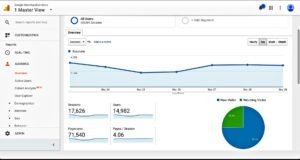In order to be successful at SEO there needs to be concentration on long-tail keywords. Generic terms may get more traffic but choosing the right long-tailed keywords will get better quality traffic with those that are more likely further down their path of intent.
The Importance of Relevance
Relevance is the key factor when choosing the correct keywords for SEO. Always remember, the more specific you are, the better. For example, if you own a company that sells plates, which keyword do you think is more likely to attract qualified prospects for your business?
“Dinner plates” vs. “organic shaped dinnerware set-metallic rimmed plates”
Obviously if someone is searching for “organic shaped dinnerware set-metallic rimmed plates,” their brain is in research mode. Optimizing for “dinner plates” has its place, but there is no doubt that this keyword will attract a much more generic audience that may not be looking for what you have to offer. Go for the relevant, long-tail keywords instead.
Location-Based Keywords
When considering optimizing the right keywords make sure you are using a location-based searches. When looking for contractors and services in their specific area, search engine users will usually include their location in the search. For example, “top-rated pizza” becomes “top-rated pizza Tampa, Florida.”
If you operate in one geo-location, you may want to consider adding location-based keywords to all of your pages, since traffic from other locations isn’t going to be very much help to you. If your business operates in several geo-locations, it is also a wise choice to create a separate web page dedicated to each location so you can make sure your brand is present when people are searching for individual locations.
Tools for Choosing the Right Keywords
Starting off may seem very challenging with keyword search. Definitely make sure you are not guessing. Instead, there are many ways to research and find long-tail keywords that are right for your business.
Here are 4 great tools you can use to quickly and easily identify strong long-tail keywords for your SEO campaign:

2. Google AdWords Keyword Tool : The Google AdWords Keyword Tool is a great place to start to make it easy for keyword search. You can insert one keyword, multiple keywords, or even your website address. Google will then return a list of related keywords along with simple metrics to gauge how strong the competition is around each one and how many searches it gets on both a global and local search level.
3. Google Insights for Search : The Google Insights for Search tool allows you to enter multiple keywords and filter by location, search history and category. Once your results are given, you will see how much interest there is for each keyword. It also reveals what caused the interest (e.g. press coverage), where the traffic is coming from, and similar keywords.
4. Keyword Grader : HubSpot also has its own Keyword Grader tool. It helps identify the best keywords for optimizing your site and also tracks results from each one. This tracking feature allows you to see which keywords are driving traffic and leads. The grader also allows you to optimize your keywords over time.
Thank you for your attention!


Recent Comments